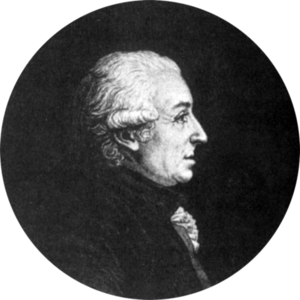Mathurin Jacques Brisson facts for kids
Quick facts for kids
Mathurin Jacques Brisson
|
|
|---|---|
 |
|
| Born | 30 April 1723 |
| Died | 23 June 1806 (aged 83) Croissy-sur-Seine, France
|
| Known for | Ornithologie |
| Awards | Academy of Sciences |
| Scientific career | |
| Fields | Zoology, ornithology, entomology |
| Institutions | College of Navarre, Paris |
| Author abbrev. (botany) | Briss. |
| Author abbrev. (zoology) | Brisson |
Mathurin Jacques Brisson (born April 30, 1723 – died June 23, 1806) was a French scientist. He studied animals and nature. He was especially known for his work with birds.
Contents
Early Life and Studies
Mathurin Jacques Brisson was born in Fontenay-le-Comte, France, in 1723. His parents hoped he would become a priest. However, Brisson chose to study science instead.
In 1749, he began working for a wealthy French scientist named René Antoine Ferchault de Réaumur. Brisson helped manage de Réaumur's large collection of natural history items. This collection included many different plants and animals.
Studying and Classifying Animals
Brisson became very interested in how to group and name animals. He was inspired by the work of other famous scientists like Carl Linnaeus. Linnaeus created a system for naming living things.
Brisson wrote an important book called Le Règne animal in 1756. This book was about the animal kingdom.
His Famous Bird Book
In 1760, Brisson published his most famous work, Ornithologie. This was a huge book about birds, with six volumes. It was highly respected by other scientists.
An English bird expert, Alfred Newton, said that Brisson's Ornithologie was "a work of very great merit." He also said that Brisson was amazing at describing birds. Brisson clearly noted if he had seen a bird himself or if he was using descriptions from other people.
How Brisson Named Birds
Brisson gave Latin names to each bird species. However, his naming system was different from the one used today. The modern system is called binomial nomenclature, which means each species has two names. Brisson's names are not officially recognized by the International Commission on Zoological Nomenclature (ICZN).
Even so, Brisson also created names for groups of similar animals, called genera (plural of genus). These genus names are still accepted by the ICZN today.
Brisson's Influence on Linnaeus
Carl Linnaeus used Brisson's work a lot when he updated his own famous book, Systema Naturae. In the 12th edition of Systema Naturae in 1766, Linnaeus added 386 new bird species. About 240 of these were based only on Brisson's detailed descriptions.
Later Career and Contributions
After de Réaumur died in 1757, Brisson stopped focusing on zoology. In 1762, he became a professor of physics at the College of Navarre in Paris.
For some time, Brisson also taught science to the royal family. In 1759, he became a member of the French Academy of Sciences. This was a great honor for a scientist.
Work on Specific Weight
In 1787, Brisson published another important book called Pesanteur Spécifique des Corps. This book was about the "specific weight" of different objects. Specific weight is how heavy something is compared to its size.
He also studied electricity. Brisson had different ideas about electricity than other famous scientists like Joseph Priestley and Benjamin Franklin.
Personal Life
Mathurin Jacques Brisson married Marie-Denise Foliot de Foucherolles in 1775. They had three children together. He passed away in 1806 near Versailles, France.
See also
 In Spanish: Mathurin Jacques Brisson para niños
In Spanish: Mathurin Jacques Brisson para niños
 | Sharif Bey |
 | Hale Woodruff |
 | Richmond Barthé |
 | Purvis Young |

